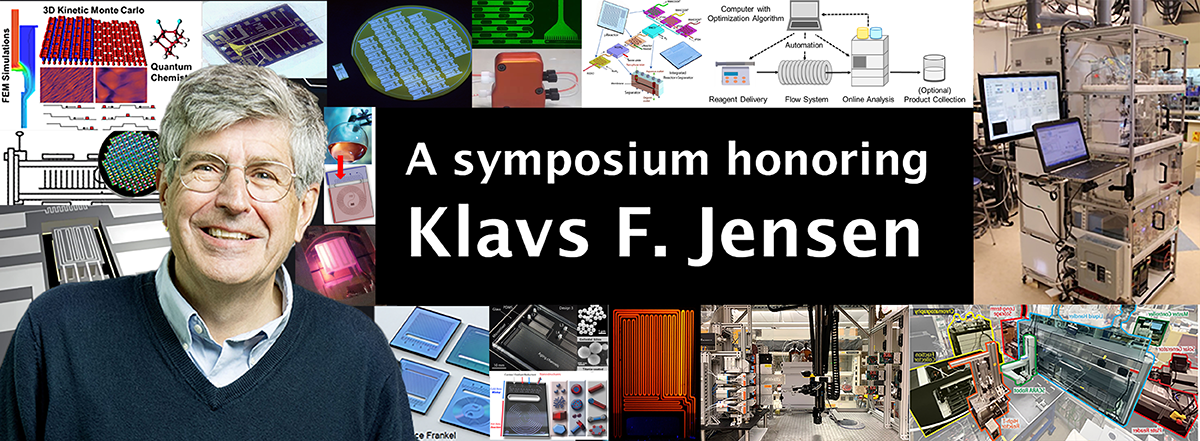On May 18, 2024, a one-day symposium of presentations and discussions was held on Professor Jensen’s many contributions to the fields of chemical engineering, materials science, and reaction engineering, as well as on the future of these disciplines. The event took place at the MIT Welcome Center and was a joyful reunion of former students, postdocs, academic and industrial colleagues.
Professor Jensen has been an incredible mentor, an impactful leader and an invaluable asset to the Chemical Engineering Department and the field of chemical engineering. We are very fortunate to have benefited from his presence throughout his career at MIT.
[Symposium Agenda]
[Photos from the Symposium]
Klavs Jensen received his MSc in chemical engineering from the Technical University of Denmark (DTU) and his PhD in chemical engineering from the University of Wisconsin-Madison. After nine years as a faculty member at the University of Minnesota, he joined MIT as the Joseph R. Mares Career Development Chair in Chemical Engineering and professor of materials science. Klavs has been the Warren K. Lewis Professor in Chemical Engineering and Materials Science and Engineering and has been a prolific member of the MIT faculty for 35 years. From 2007 to July 2015, he served as Head of the MIT Chemical Engineering Department. During that time, he renewed over a third of the Department’s faculty, making critical hires in key areas. Thanks to his steady leadership and thoughtful planning, he oversaw major renovations in the Department’s buildings to enable space commensurate with the level of our research activity, leaving this leadership role with most faculty in new or recently renovated space.
Throughout his career, Klavs has focused on reaction engineering with a strong focus on integrating physical models and chemistry at multiple length and temporal scales to provide unique insights, physically realistic simulations across time and length scales, effective modes of analysis, and innovative new designs. For example, his modeling work with detailed chemical mechanisms and multi-physics models generated fundamental understanding and design rules for the optimal design of thin film manufacturing by chemical vapor deposition and plasma processing. Furthermore, to verify his theories and models, he pioneered new experimental techniques for the synthesis of materials (e.g., the growth of compound semiconductor thin films, and quantum dot structures for new optical and electronic devices).
His work has brought together micro- and nano-fabrication methods, novel chemical synthesis and characterization, and multi-scale reaction engineering simulations, leading to the realization of a range of discoveries, technologies, and products. His pioneering micro-reaction technologies helped elucidate chemical kinetics along with rate-limiting processes in heterogeneous catalysis, multiphase reactions, and synthesis of colloidal nanoparticles. These insights generated new technologies for portable energy, biochemical processes, and reactions relevant to novel therapeutic applications. With chemistry colleagues, Klavs greatly expanded the chemical manufacturing toolbox by conceptualizing continuous multistep synthesis of active pharmaceutical ingredients. The resulting reaction engineering techniques helped pharmaceutical manufacturing to transition to nimble small-scale production of new active pharmaceutical ingredients. Moreover, his lab pioneered small-scale systems integrated with analytic equipment and optimization algorithms as efficient automated platforms for optimizing chemical synthesis conditions and studying chemical kinetics.
In 2015, Klavs reached out to his computer science colleagues to explore whether tools from artificial intelligence, specifically machine learning, could enhance the chemical engineer’s abilities to plan chemical synthesis. The resulting team of MIT faculty, postdocs, and students created a suite of machine learning algorithms addressing the core challenges of computer-aided synthesis planning: proposing reaction steps, specification of reaction conditions and process variables, predicting outcomes of individual reactions, and integrating reactions into feasible multistep pathways. The effort formed the basis for a consortium of major pharmaceutical and chemical companies, Machine Learning for Pharmaceutical Discovery and Synthesis (mlpds.mit.edu). Moreover, this advance enabled Klavs and his coworkers to create an automated synthesis platform capable of planning its synthetic routes and then executing them under conditions that met specific goals. The subsequent incorporation of online analytical tools enabled autonomous optimization of multistep chemical synthesis and discovery of molecules.
Klavs has received several awards, including a National Science Foundation Presidential Young Investigator Award, the Camille and Henry Dreyfus Foundation Teacher-Scholar Award, a Guggenheim Fellowship, the Allan P. Colburn, the Charles C.M. Stine, the R.H. Wilhelm, W.H. Walker, and Founders Awards of the American Institute of Chemical Engineers, and the inaugural IUPAC-ThalesNano Prize in Flow Chemistry. He is a member of the US National Academy of Sciences, the US National Academy of Engineering, and the American Academy of Arts and Science. He is a Fellow of the American Association for the Advancement of Science (AAAS), the National Academy of Inventors, the American Institute of Chemical Engineers, and the Royal Society of Chemistry.
Klavs and his coworkers have contributed 500 peer-reviewed papers, 178 conference proceedings as 8 edited volumes, and 66 US patents. Google Scholar lists 73,350 citations and an h-index of 137. He was the inaugural Editor-in-Chief of the Royal Society of Chemistry Journal, Reaction Chemistry and Engineering, from 2015 to 2023.


